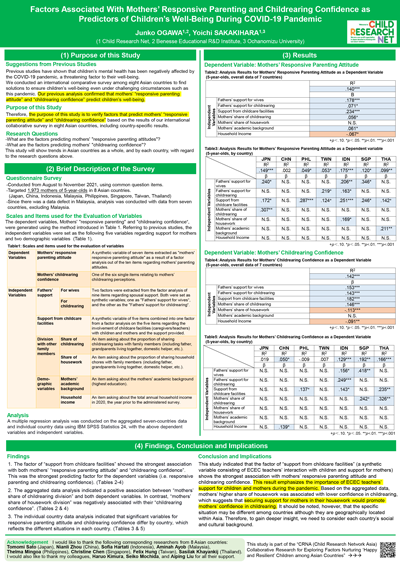 |
a. Necessity of the study
Previous studies revealed that the COVID-19 pandemic has negatively affected children's mental health. This research was conducted to find solutions to ensure children's well-being even under challenging circumstances such as this pandemic. Our previous analysis confirmed that mothers' "responsive parenting attitude" and "childrearing confidence" predict children's well-being. This paper further discusses factors associated with these variables.
b. Purpose and research questions of the study
The purpose of this study is to verify factors that predict mothers' "responsive parenting" and "childrearing confidence" based on the results of our international collaborative survey in eight Asian countries, including country-specific results.
c. A brief description of method including participants, tool or measure, and data analysis
A questionnaire survey was conducted among 1,973 mothers of five-year-old children in eight Asian countries between August and November 2021. We did a factor analysis on the ten question items regarding mothers' parenting attitudes, and extracted two factors of mothers' "responsive parenting attitude" and "negative parenting (reversed)" as dependent variables. We also extracted mothers' "childrearing confidence" and "tendency to compare with other children (reversed)" from six single items relating to mothers' childrearing perceptions, which have been confirmed to be associated with children's well-being in each country. Referring to previous studies, we established "fathers' support (for wives and childrearing)," "support from childcare facilities", and "share of housework/childrearing division (support from family members including father)" as independent variables, and "mothers' academic background" and "household income" as demographic variables.
Finally, a multiple regression analysis was conducted on the aggregated eight-countries data and individual country data using IBM SPSS Statistics 24.
d. Summary of findings or conclusions and implications (For ongoing research studies -expected outcomes and anticipated contribution of the research)
FindingsThe dependent variables of mothers' "responsive parenting" and "childrearing confidence" were strongly predicted by independent variables. Therefore, focusing on these two variables, the following findings were confirmed:
- The factor of "support from childcare facilities" showed the strongest association with both mothers' "responsive parenting attitude" and "childrearing confidence". This was the strongest predicting factor for the dependent variables (i.e. responsive parenting and childrearing confidence).
- The aggregated data analysis indicated a positive association between "mothers' share of childrearing division" and both dependent variables. In contrast, "mothers' share of housework division" was negatively associated with their "childrearing confidence".
- The individual data analysis indicated that significant variables for responsive parenting attitude and childrearing confidence differ by country, which reflects the different situations in each country.
This study indicated that the factor of "support from childcare facilities" (a synthetic variable consisting of ECEC teachers' interaction with children and support for mothers) shows the strongest association with mothers' responsive parenting attitude and childrearing confidence. This result emphasizes the importance of ECEC teachers' support for children and mothers during the pandemic. Based on the aggregated data, mothers' higher share of housework was associated with lower confidence in childrearing, which suggests that securing support for mothers in their housework would promote mothers' confidence in childrearing. It should be noted, however, that the specific situation may be different among countries although they are geographically located within Asia. Therefore, to gain deeper insight, we need to consider each country's social and cultural background.
*This poster was presented at the 23rd Annual Conference of PECERA held in Bali, Indonesia, from July 7 to 9, 2023.



 Junko Ogawa
Junko Ogawa










